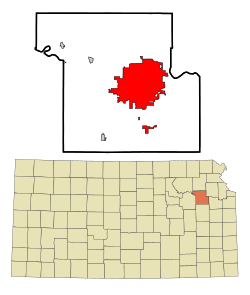Topeka, Kansas | |
|---|---|
Downtown skyline from Burnett's Mound | |
|
| |
 Location within Shawnee County and Kansas | |
 Interactive map of Topeka | |
| Coordinates: 39°02′05″N 95°41′44″W / 39.03472°N 95.69556°W[1] | |
| Country | United States |
| State | Kansas |
| County | Shawnee |
| Founded | 1854 |
| Incorporated | 1857 |
| Government | |
| • Type | Council-Manager |
| • Mayor | Mike Padilla (D)[2] |
| • City Manager | Stephen Wade [3] |
| Area | |
| 62.76 sq mi (162.53 km2) | |
| • Land | 61.44 sq mi (159.14 km2) |
| • Water | 1.31 sq mi (3.39 km2) |
| Elevation | 938 ft (286 m) |
| Population | |
| 126,587 | |
• Estimate (2021)[7] | 125,963 |
| • Rank | US: 222nd KS: 5th |
| • Density | 2,000/sq mi (780/km2) |
| • Urban | 150,003 (US: 217th) |
| • Metro | 232,670 (US: 200th) |
| Demonym | Topekan |
| Time zone | UTC-6 (CST) |
| • Summer (DST) | UTC-5 (CDT) |
| ZIP Codes | 66601–66612, 66614–66622, 66624–66626, 66628–66629, 66636–66637, 66642, 66647, 66652–66653, 66667, 66675, 66683, 66692, 66699[8] |
| Area code | 785 |
| FIPS code | 20-71000 |
| GNIS ID | 485655[1] |
| Website | topeka.org |
Topeka (/təˈpiːkə/ tə-PEE-kə)[9][10] is the capital city of the U.S. state of Kansas and the county seat of Shawnee County.[1] It is along the Kansas River in the central part of Shawnee County, in northeast Kansas, in the Central United States. As of the 2020 census, the population of the city was 126,587.[5][6] The Topeka metropolitan statistical area, which includes Shawnee, Jackson, Jefferson, Osage, and Wabaunsee Counties, had a population of 233,870 in the 2010 census.
The city, laid out in 1854, was one of the Free-State towns founded by Eastern antislavery men immediately after the passage of the Kansas–Nebraska Bill. In 1857, Topeka was chartered as a city.
The city is well known for the landmark U.S. Supreme Court case Brown v. Board of Education of Topeka, which overturned Plessy v. Ferguson and declared racial segregation in public schools to be unconstitutional.[11]
- ^ a b c d U.S. Geological Survey Geographic Names Information System: Topeka, Kansas
- ^ "Mayor - City of Topeka". www.topeka.org. Archived from the original on July 13, 2018. Retrieved January 22, 2018.
- ^ Cite error: The named reference
Topeka-CityManagerwas invoked but never defined (see the help page). - ^ "2019 U.S. Gazetteer Files". United States Census Bureau. Retrieved July 24, 2020.
- ^ a b "Profile of Topeka, Kansas in 2020". United States Census Bureau. Archived from the original on June 8, 2022. Retrieved June 8, 2022.
- ^ a b "QuickFacts; Topeka, Kansas; Population, Census, 2020 & 2010". United States Census Bureau. Archived from the original on August 24, 2021. Retrieved August 24, 2021.
- ^ Cite error: The named reference
USCensusEst2021was invoked but never defined (see the help page). - ^ "USPS - Look Up a ZIP Code". United States Postal Service. 2012. Archived from the original on May 25, 2019. Retrieved February 15, 2012.
- ^ Jones, Daniel (2003) [1917], Peter Roach; James Hartmann; Jane Setter (eds.), English Pronouncing Dictionary, Cambridge: Cambridge University Press, ISBN 3-12-539683-2
- ^ "Topeka". Merriam-Webster.com Dictionary. Merriam-Webster.
- ^ "Supreme Court of the United States Brown v. Board of Education, 347 U.S. 483 (1954) (USSC+)" (PDF). Archived from the original (PDF) on May 29, 2010. Retrieved May 7, 2010.






